European integration is the process of industrial, economic, political, legal, social, and cultural integration of states wholly or partially in Europe, or nearby. European integration has primarily but not exclusively come about through the European Union and its policies.

The Balkan Pact of 1953, officially known as the Agreement of Friendship and Cooperation, was a treaty signed by Greece, Turkey and Yugoslavia on 28 February 1953. It was signed in Ankara. The treaty was to act as a deterrence against Soviet expansion in the Balkans and provided for the eventual creation of a joint military staff for the three countries. When the pact was created and signed, Turkey and Greece had been members of the North Atlantic Treaty Organization (NATO) for a year, having both joined on 18 February 1952, while Yugoslavia was a socialist non-aligned state that later became a founding member of the Non-Aligned Movement. The Balkan Pact allowed Yugoslavia to associate itself with NATO indirectly on geopolitical affairs. In October 1954, Israel showed some interest in joining the alliance in expectation that Yugoslavia could mediate in development of the Egypt–Israel relations. However, Israel never ended up joining the alliance.

Cyprus–Malta relations are foreign relations between Cyprus and Malta. The two countries share membership of the European Union, Commonwealth of Nations and historically, the Non-Aligned Movement. Cyprus is represented to Malta through its accredited embassy in Rome (Italy). Malta is represented to Cyprus through its accredited embassy in Athens (Greece). The political relations are close due to similarities between the 2 countries. They are the two island countries of the Mediterranean Sea. By May 2004, the two island countries entered the European Union.

The largest enlargement of the European Union (EU), in terms of number of states and population, took place on 1 May 2004.
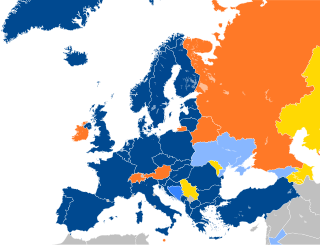
NATO maintains foreign relations with many non-member countries across the globe. NATO runs a number of programs which provide a framework for the partnerships between itself and these non-member nations, typically based on that country's location. These include the Euro-Atlantic Partnership Council and the Partnership for Peace.

The Socialist Federal Republic of Yugoslavia was one of the founding members of the Non-Aligned Movement. Its capital, Belgrade, was the host of the First Summit of the Non-Aligned Movement in early September 1961. The city also hosted the Ninth Summit in September 1989.
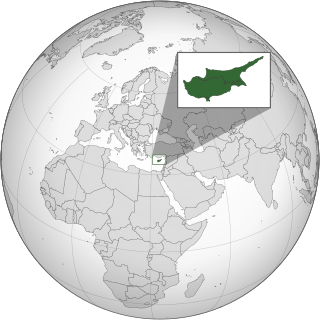
Cyprus–Yugoslavia relations were historical foreign relations between Cyprus and now split-up Socialist Federal Republic of Yugoslavia. Together with Malta, both countries belonged to the small group of European and Mediterranean member states of the Non-Aligned Movement during the Cold War, group which itself part of the larger group of neutral and non-aligned European countries. Two countries shared similar or identical views on many international issues and cooperated closely in the United Nations and at various gatherings of the non-aligned countries. Makarios III participated in the 1961 Summit Conference of Heads of State or Government of the Non-Aligned Movement in Belgrade which was the first official conference of the Non-Aligned Movement.

Finland–Yugoslavia relations were historical foreign relations between Finland and now split-up Kingdom of Yugoslavia or Socialist Federal Republic of Yugoslavia. Both countries gained their independence during or in the immediate aftermath of the World War I and the collapse of Austria-Hungary (Yugoslavia) or Russian Empire (Finland). Two parties established formal bilateral relations in 1928. Two countries developed their relations after the end of the World War II and 1948 Tito–Stalin split. At the time neither one of them was a part of either Eastern or Western Bloc in the Cold War divided Europe. Both countries perceived development of relations among non-bloc neutral European states as a way to avoid isolation and preserve certain level of independence without alienating major powers. Belgrade however perceived that in deeply divided Europe there was shrinking maneuvering space for neutral countries and followed the development of what will be called process of Finlandization with great concern. It therefore turned its focus on new allies among former colonies and mandate territories outside of Europe where it developed its policy of equidistant active neutrality via its activities in the newly founded Non-Aligned Movement.
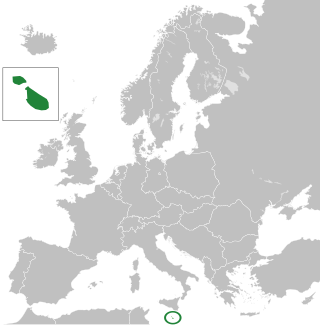
Malta–Yugoslavia relations were historical foreign relations between Malta and now split-up Socialist Federal Republic of Yugoslavia. Together with Cyprus, both countries belonged to the small group of European and Mediterranean member states of the Non-Aligned Movement during the Cold War, group which itself part of the larger group of neutral and non-aligned European countries. The Non-aligned countries in Europe advocated for relaxation of divisions, rejection of superpowers' spheres of influence and for cooperation of diverse countries on the continent. During the Cold War period all three Non-Aligned Euro-Mediterranean countries developed close economic cooperation with the European Economic Community.
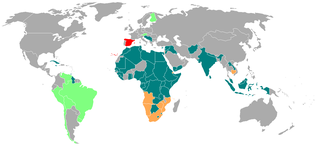
Third Conference of the Non-Aligned Movement on 8–10 September 1970 in Lusaka, Zambia was the third conference of the Non-Aligned Movement. A preparatory meeting of Foreign Ministers drafted a number of resolutions which were considered by the Summit Conference. President of Zambia Kenneth Kaunda opened the conference by underlining non-alignment as "the natural choice at the time of increased hostility created by ideological conflicts in the bipolar world"

The Non-Aligned Movement (NAM) is a forum of 120 countries that are not formally aligned with or against any major power bloc. It was founded with the view to advancing interests of developing countries in the context of Cold War confrontation. After the United Nations, it is the largest grouping of states worldwide.

Foreign relations of Yugoslavia were international relations of the interwar Kingdom of Yugoslavia and the Cold War Socialist Federal Republic of Yugoslavia. During its existence, the country was the founding member of numerous multilateral organizations including the United Nations, Non-Aligned Movement, International Monetary Fund, Group of 77, Group of 15, Central European Initiative and the European Broadcasting Union.
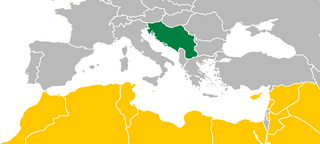
The 1984 Mediterranean Non-Aligned Countries Ministerial Meeting held in Valletta, Malta on 10 and 11 September 1984 was the first ever ministerial meeting of the Non-Aligned countries from the Mediterranean region. The idea of the organizer was to host an event with restricted number of participants from the Mediterranean basin where common concerns will be addressed. At the time, the group included Southern Mediterranean and Levantine Arab countries and only three European Non-Aligned countries of Malta, Cyprus and SFR Yugoslavia. The meeting concluded that freedom of the seas in a closed sea like Mediterranean should be exercised for peaceful purposes without military naval deployment, especially by non-Mediterranean countries. The event was envisaged as a preliminary collective effort by the countries concerned at the achievement of the peace in the region. The following meeting of the group was organized in 1987 on the Brijuni Islands in the Yugoslav constituent Socialist Republic of Croatia. The final document of the meeting was subsequently reaffirmed by the NAM movement as a whole when at the 1985 Luanda foreign ministers meeting the final document of that meeting called states of the world to respect the 1984 Valletta Declaration.
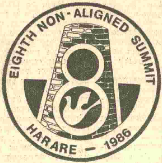
8th Summit of the Non-Aligned Movement on 1–6 September 1986 in Harare, Zimbabwe was the conference of heads of state or government of the Non-Aligned Movement. 101 countries took part in the summit, 51 of which were African countries. Explicitly expressed South–South cooperation call appeared for the first time in the 1986 NAM final declaration.

The 1987 Mediterranean Non-Aligned Countries Ministerial Meeting held on Brijuni Islands, SR Croatia, SFR Yugoslavia was the second ministerial meeting of the Non-Aligned countries from the Mediterranean region. The meeting restricted the number of participating countries exclusively to the few Non-Aligned nations of the Mediterranean area and as such focused primarily on regional issues. At the time of the meeting the group included Southern Mediterranean and Levantine Arab countries and only three European Non-Aligned countries of Malta, Cyprus and SFR Yugoslavia.

1978 Non-Aligned Foreign Ministers Conference was held in Belgrade, SR Serbia, SFR Yugoslavia, between 25 and 30 July 1978. The conference was organized as a preparatory event ahead of the divisive 6th Summit of the Non-Aligned Movement which took place in Havana next year. The NAM member states were deeply divided over Cuban military actions in Africa and country's pro-Soviet politics with some of them threatened to boycott the Summit in Havana. The host country of Yugoslavia was recognized as the leader of the middle ground delegations which wanted to overcome divisions and radicalism and was in this effort supported primarily by India, Sri Lanka and Indonesia.

Mediterranean island country of Cyprus was one of the founding members of the Non-Aligned Movement with Makarios III attending the 1st Summit of the Non-Aligned Movement in Belgrade, SFR Yugoslavia in 1961, just one year after the Cypriot independence. Membership in the movement was perceived as one of two major foreign-policy alternatives with the first one being formal membership in NATO at least nominally supported by both Greece and Turkey in the initial period after the London and Zürich Agreements and second one being pro-western participation in Non-Aligned Movement where United Kingdom and United States preferred this option at least until 1963.

Malta and the North Atlantic Treaty Organization (NATO) have a close relationship. Malta is one of four members of the European Union that are not members of NATO, the others being Austria, Cyprus and Ireland. Malta has had formal relations with NATO since 1995, when it joined the Partnership for Peace programme. While it withdrew in 1996, it rejoined as a member in 2008.

Neutral and Non-Aligned European States, sometimes known by abbreviation NN states, was a Cold War era informal grouping of states in Europe which were neither part of NATO nor Warsaw Pact but were either neutral or members of the Non-Aligned Movement. The group brought together neutral countries of Austria, Finland, Sweden and Switzerland on one, and non-aligned SFR Yugoslavia, Cyprus and Malta on the other hand, all of which together shared interest in preservation of their independent non-bloc position with regard to NATO, European Community, Warsaw Pact and the Council for Mutual Economic Assistance. Established and comparatively highly developed European neutral countries perceived cooperation with non-aligned countries as a way to advocate for peace, disarmament and superpowers' restraint more forcefully than their limited earlier cooperation would permit.

The 1985 Non-Aligned Foreign Ministers Conference was held in Luanda, capital of Angola from 4 to 7 September with the senior officials meeting being held on 2 and 3 September. The organization of the conference in the circumstances of the ongoing Angolan Civil War was described as a large scale organizational undertaking and a considerable achievement.



















